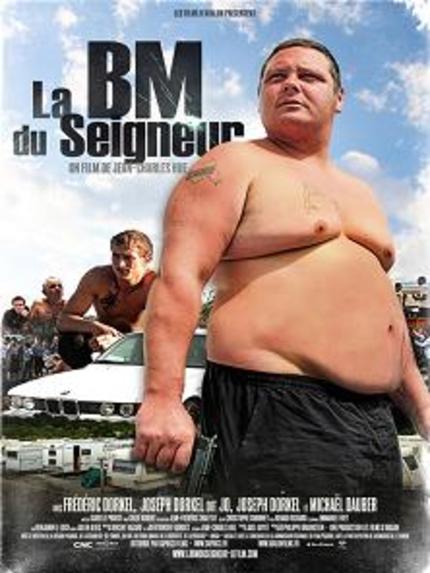Bradford 2012 Review: THE LORD'S RIDE

The world we're dealing with is a community of Yéniche travellers (like gypsies, but distinct from Romany, most visibly in that they're commonly blonde-haired and blue-eyed). The main family survive on the fringes via petty crime, boosting cars, trading in stolen goods and the like, loosely governed by their patriarch - with one wild child offspring threatening the stability of the camp and another family demanding restitution for all the damage he's causing, the resultant bickering gives the older generation a relatively full plate from day to day just keeping it all in check. Fred, the overweight strong man of the bunch, is happy to drift through all this, until one night a strange, seemingly supernatural visitation leads him to question whether his life is everything it could be.
The Lord's Ride is part documentary, of sorts, part dramatisation - the community are a real band of Yéniche, non-actors who are effectively playing themselves, and Fred's epiphany is Hue's take on a real crisis they went through. The director apparently discovered he could trace his ancestry to Yéniche forebears, and approached the Dorkel family, the stars of the film, with a view to shooting a fictional feature around them as a natural progression from the multimedia installations with which he started his career. It's a bizarre mix of cinema verite and fly-on-the-wall vignettes, sitting quietly somewhere between the effortless, dispassionate accounts in Wang Bing's documentaries and the no-frills storytelling of directors like the Dardennes.
Hue has an eye for fleeting camera setups that turn the mundane - the sun rising, a puddle of water - into something almost joyous in its simplicity. The Lord's Ride has the unhurried placidity of some scratchy old piece of found footage in places, the feel of staring wide-eyed through a window onto something you'd normally never get to see. Not in the sense that Hue exoticises his cast, frames them like animals at the zoo or any such thing - more that he succeeds in conveying something of how precious the bonds that hold this little world together are, for all the squabbling and violence, threatened or otherwise. Like criminal dynasties, these people may not live by our rules, we may not like the things they do to get by, but that doesn't mean they don't care for each other.
It's never made entirely clear how much is acting and how much is documentary, but all the cast do a commendable job of simply being themselves (as far as we know). They shoot the breeze, joke, argue, shout and come to blows without giving any sense any of this is being put on for the camera: the bare-knuckle showdown that caps the little story arc about the problem child feels sickeningly real. There's purpose behind all this, as well. The character development is a very loose, informal thing but it's definitely there. Once Fred has his close encounter - for want of a better term - the reactions from the rest of the family feel as believable as you'd expect. The Yéniche don't eschew religion, they readily quote scripture, but theirs is a fairly pragmatic faith and the idea Fred is about to renounce criminality entirely is viewed first with puzzlement, then derision, then anger.
Yet Hue's gift for atmosphere and characterisation doesn't make the journey he's attempting to take us on any less weighty, and it's here The Lord's Ride falls down somewhat. For all the cast's good qualities, and everything communities like theirs have suffered because society mistrusts anyone who doesn't play by the rules, they still live by breaking the law. They settle disputes with their fists or the barrel of a gun. Hue credibly makes no attempt to play this as any didactic conflict between black and white - gypsies good, civilisation bad. Conversely, though, that means there's no real attempt to make you sympathise with them either, leaving the Yéniche a bit alien, intimidating, weird.
It's difficult enough to work up real sympathy for or emotional attachment to the Yéniche from a comfortable cinema seat as it is, and when you add one of them attaining Buddhahood to the mix The Lord's Ride starts to demand real work to get the most out of it. It doesn't help that what precisely happened to Fred is never fully explained (and if that sounds like a spoiler, you're probably not going to enjoy the film at all). Jean-Charles Hue definitely has considerable gifts as a director, but while his ambition is admirable and his sophomore feature has a sense of magic and wonder like few other films out there, you have to wonder why he couldn't just dial it back a notch. If you can put the mental effort in, The Lord's Ride comes strongly recommended, but it takes a hell of an investment.
(The Lord's Ride was screened at the 18th Bradford International Film Festival, held in the UK National Media Museum in Bradford from 19th-29th April 2012.)

Do you feel this content is inappropriate or infringes upon your rights? Click here to report it, or see our DMCA policy.






